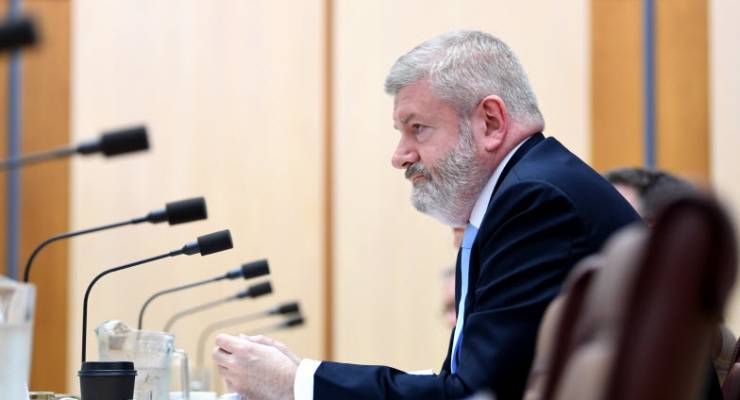
News Corp and its pay television company Foxtel have both suggested that Google should be forced to censor websites deemed to host copyright-infringing content — similar to the court orders put on internet service providers.
In 2015, the federal government passed laws that allow film, television, and music companies to go to court, in order to force Telstra, Optus and other internet service providers to block people’s access to piracy websites offering their content for free.
Village Roadshow is currently before the court, attempting to block over 40 websites it says constitute around 90% of the piracy sites visited by Australians. Foxtel has suggested to the government that Google, Facebook, and other online services, should also be required to block access to such sites if controversial safe harbour copyright exceptions — which basically protect service providers from secondary liability in piracy cases — were extended to these services.
The government was planning on extending safe harbour protections for libraries, educational institutions, cloud providers, and online services like Google and Facebook, as part of legislation introduced in the Parliament this week — but, at the last minute, the safe harbour amendment was dropped, with Communications Minister Mitch Fifield saying the government needed to hold more consultation on the matter.
This left some in the industry scratching their heads, as there have been no fewer than seven consultations on the issue of safe harbour over the past few years. But following the publication of submissions on the exposure draft of the legislation, it became clear that content owners had been concerned about the government including this in the legislation. News Corp Australia said what would be defined as a service provider would be so broad that even piracy sites would be protected. Foxtel said it was “very surprised to see” the proposal.
“No explanation has been provided as to the reasons for this change.”
Both News Corp and Foxtel said that, if the government were to embark on this change, site-blocking laws should also apply to the likes of Google, Twitter, and other online services.
“If service providers are to have the benefit of safe harbour, then section 115A should be similarly extended, such that rights holders are able to seek orders requiring service providers to block access to websites hosted overseas which have the primary purpose of infringing copyright,” Foxtel’s chief general counsel, Lynette Ireland, said in the submission.
“We question why it is not proposed, that these too be extended to service providers,” News Corp said in its submission.
Google already complies with Digital Millennium Copyright Act (DCMA) notices to remove piracy sites from its search results, and it is unclear how such a regime would operate, given the method of blocking websites developed by the court to date is very specific to the operation of ISPs.
The government appears to have a big fight ahead on safe harbour should it decide to proceed. Music Rights Australia said that there was no evidence to support the reforms, and questioned why the government would embark on such a change when the US and Europe are both reviewing their safe harbour schemes (which the government seeks to bring Australia in line with).
The call for safe harbour has mostly emerged from tech companies, including Google. In their submission, Google said that, while tech companies are offered safe harbour protections in the US and elsewhere, they have no protection in Australia — which places Australian companies at a “serious commercial disadvantage” compared to global competitors and Australian-based ISPs. In August last year, 25 organisations, including Redbubble — currently involved in a lawsuit over content hosted on its website — eBay, Microsoft, Twitter, and Envato, wrote to Fifield asking for the safe harbour extensions to encourage innovation and increase legal certainty for the companies.
Since the removal of safe harbour extensions from the Copyright Act amendment legislation, it is now considered “non-controversial” legislation that will pass through Parliament uncontested, even though the government has said it will consult more on safe harbour.
The legislation passed through the House of Representatives on Tuesday. Labor’s shadow minister for the digital economy, Ed Husic, accused the government of being “friends with Hells Angels” for siding with the motorcycle gang over RedBubble in a copyright dispute similar to that which the company is now engaged in with Pokemon:
“You are aiding and abetting the Hells Angels in squeezing out an Australian firm from our local environment, because you did not provide safe-harbour reform. The Hells Angels complained to Redbubble about an image used on their site, and Redbubble took it down. That normally would be the end of the story. In the US context the Hells Angels would not have a leg to stand on. But, they shopped around and realised that with some of the toughest copyright laws right here, they could sue Redbubble — even though Redbubble as a platform, as a marketplace, took the action.”
The minister representing Fifield in the House of Reps, Paul Fletcher, said there would not be another inquiry into safe harbour, but a consultation by government.
Village Roadshow’s case to block over 40 websites including new versions of previously-blocked sites like The Pirate Bay, is expected to be resolved by the Federal Court quickly in early May.








Piracy sites offering illegal sports re-broadcasts for free should certainly be closed down.
But can this wait until after the end of the AFL season, please?